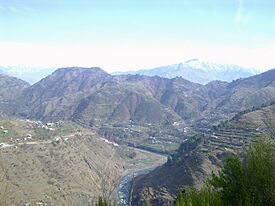Boi Union Council facts for kids
Quick facts for kids
Boi
|
|
|---|---|

View of river Kunhar between Meera Boi and Athyial Mzd taken from Thanda Nara.
|
|
| Country | |
| Province | |
| District | Abbottabad |
| Tehsil | Abbottabad |
| Population
(2017 Census of Pakistan)
|
|
| • Total | 9,978 |
| Time zone | UTC+5 (PST) |
Boi (Urdu: بوئی) is a town in Pakistan, located in the Khyber Pakhtunkhwa province. It is one of the many "union councils" in the Abbottabad District. A union council is like a small local government area that helps manage the community.
The name "Boi" comes from the Hindko language. It means "fragrance of roses," because many beautiful rose flowerbeds grow in the area.
Where is Boi?
The Union Council of Boi is found in the northwest part of the Abbottabad District. It shares a border with Kashmir, near the Muzaffarabad District.
Boi is located at specific coordinates: 34°18'10" North and 73°26'20" East. It sits quite high up, about 853 meters (or 2,801 feet) above sea level.
Boi's History
Boi has an interesting past. Long ago, it was a group of 25 small villages nestled in the hills above the Kunhar river. These villages were originally part of the land ruled by a leader named Sultan Hussain Khan, who was the Bamba Chief of Muzaffarabad.
In 1847, Sultan Hussain Khan had to leave his territory in Muzaffarabad. After that, he came to live in the village of Boi. He passed away in 1860. His son, Sultan Barkat Khan, then became the chief.
Later, Sultan Barkat Khan's son, Sultan Hassan Ali Khan Sani, became the leader. He was known as a wise and fair ruler. People respected him so much that they called him "Baba Sahib," which means "respectable elder."
The people living in Boi's villages owned their own land. These communities included different groups like the Abbasi, Awans, Karrals, and others.
Areas in Boi
The Boi Union Council is divided into several smaller areas. These areas help organize the community and its services.
Some of the areas within Boi include:
- Bandi Samanand
- Dhanni
- Mustafa Abad
- Barbeen
- Batangi
- Boi
- Didal
- Nakka
- Pal
- RanKot
- Tori


